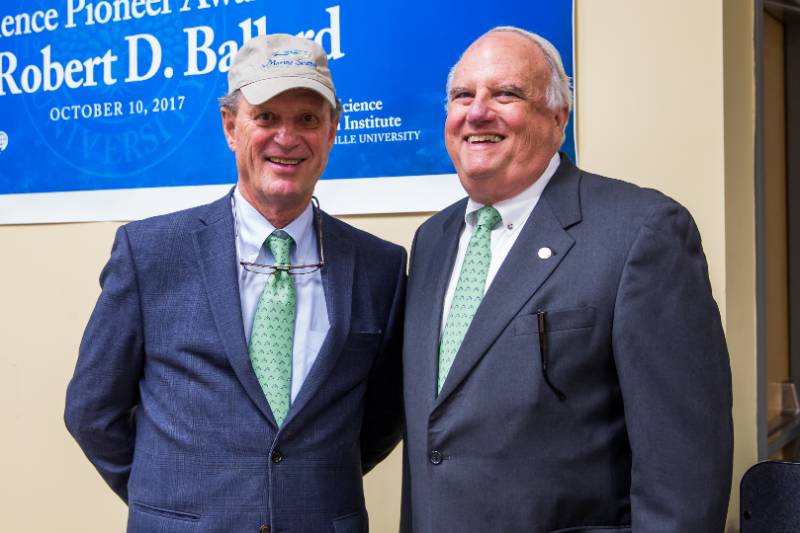Marine Science Pioneer Award Past Recipients
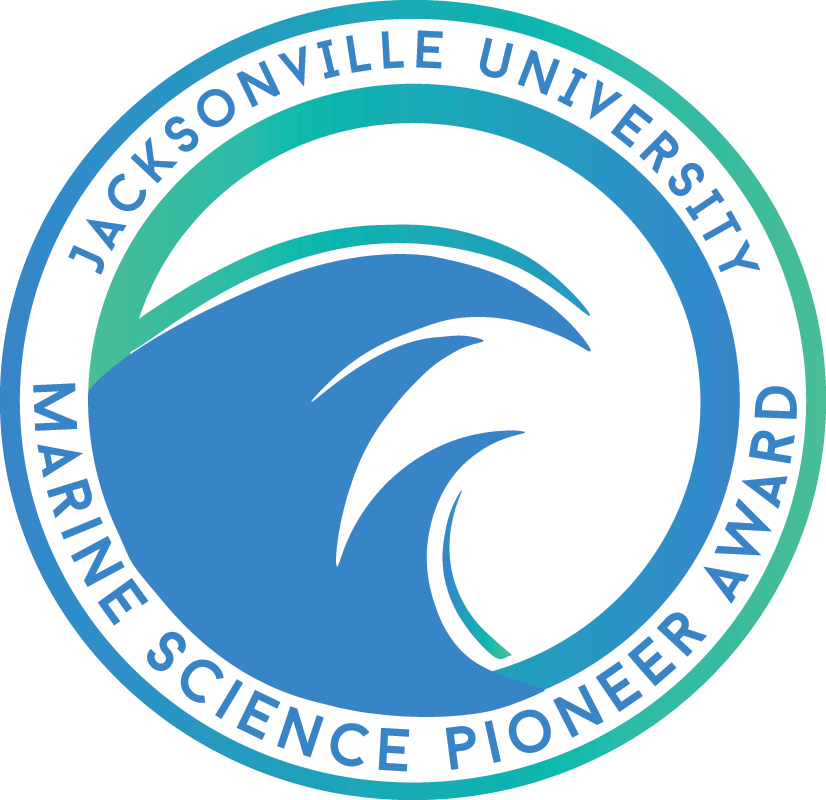 About the Marine Science Pioneer Award
About the Marine Science Pioneer Award
The Jacksonville University Marine Science Pioneer Award is presented to an exemplary leader in marine science whose visionary leadership has served as an inspiration to others, particularly students. Their influence extends well beyond marine science. This extraordinary individual fully embraces the University's ideal of a lifelong learner, bringing to bear their remarkable talents to create new opportunities to lead, live, and learn.
Past Award Recipients
November 2, 2023
Dr. Helen Czerski
Physicist and Oceanographer at University College London's Department of Mechanical
Engineering, Author of The Blue Machine and Storm in a Teacup
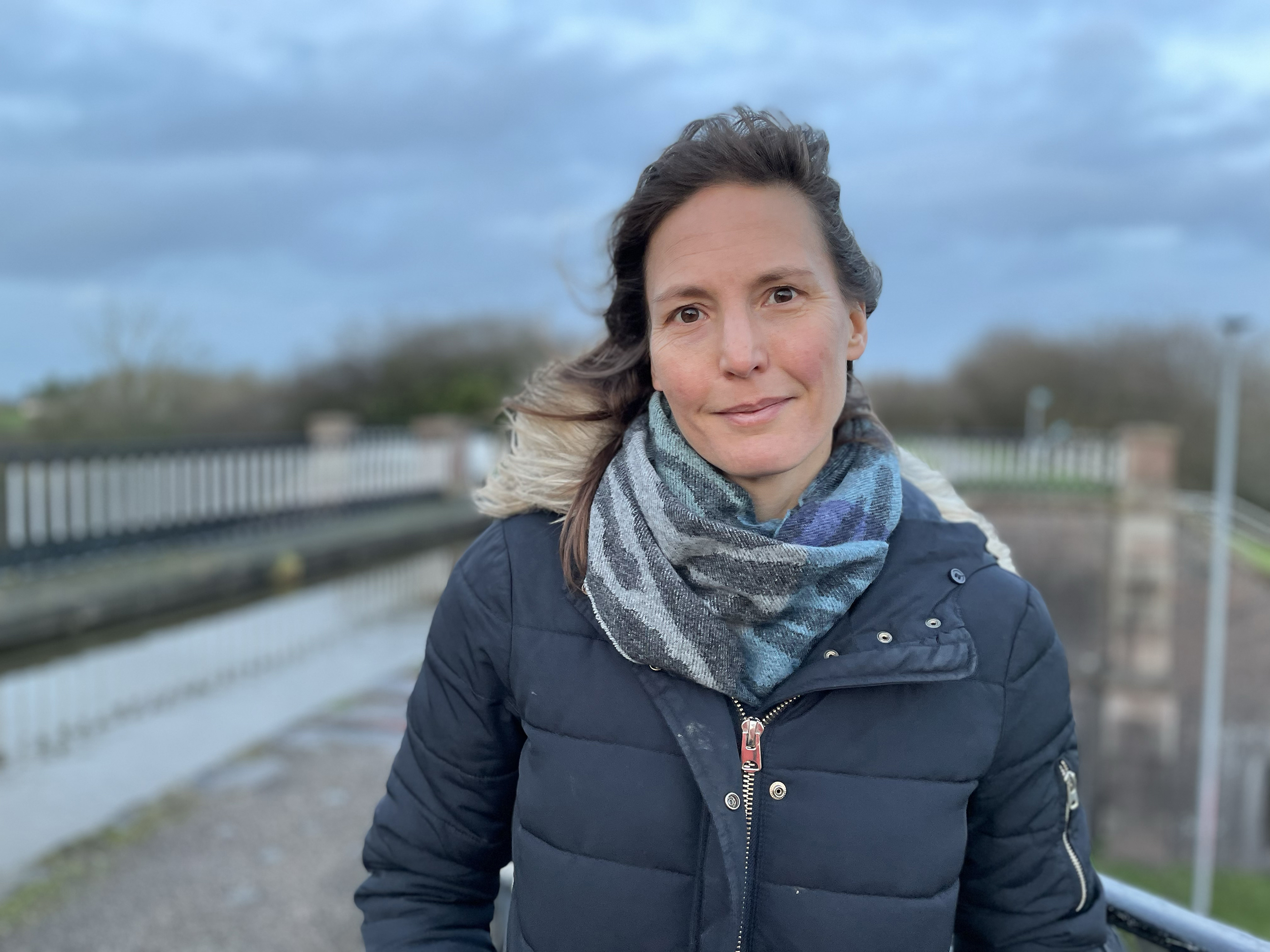 Helen is a physicist, first and foremost, but she’s acquired a few other labels along the
way: oceanographer, presenter, author and bubble enthusiast. She was born and brought
up near Manchester in the northwest of England and spent her childhood playing by
the canals and along the old railway routes of the early Industrial Revolution. Math
and science (especially physics) always felt as though they would be her focus in
the long term, and she studied Natural Sciences (Physics) at Churchill College, Cambridge,
finishing with a first-class degree. A year later, she returned to Cambridge to study
for a PhD in experimental explosives physics, motivated by the opportunity to use
high-speed photography to explore the physical world further.
Helen is a physicist, first and foremost, but she’s acquired a few other labels along the
way: oceanographer, presenter, author and bubble enthusiast. She was born and brought
up near Manchester in the northwest of England and spent her childhood playing by
the canals and along the old railway routes of the early Industrial Revolution. Math
and science (especially physics) always felt as though they would be her focus in
the long term, and she studied Natural Sciences (Physics) at Churchill College, Cambridge,
finishing with a first-class degree. A year later, she returned to Cambridge to study
for a PhD in experimental explosives physics, motivated by the opportunity to use
high-speed photography to explore the physical world further.
After her PhD, she looked around for another subject that would allow her to continue
to build that sort of experiment, but with an application in the natural world. That’s
when she found out about bubbles and oceans. The Scripps Institution of Oceanography
in San Diego was her door into that world, followed by a postdoc at the Graduate School
of Oceanography in Rhode Island. And then she came back to the UK to start her own
research program on the physics of oceanic bubbles, first at the University of Southampton
and then at her current academic home, University College London.
Helen gets particularly excited about the physics of the everyday world and the oceans.
Looking up at the cosmos is very important for our awareness of our place in the universe,
but the vast majority of the rules that make the universe tick can be seen around
us in our daily lives. Helen loves to play with the world, and to encourage others
to have confidence in their ability to explore it and think about it too. And the
oceans are the heart of the Earth’s engine, the system of atmosphere, rocks, ice,
life and ocean that makes up our planetary life support system. Beyond the purely
scientific, Helen is fascinated by the relationship between human civilizations and
the oceans, and how these vast expanses of blue have shaped and influenced the structure
of human society.
Since 2011, she has presented many BBC science documentaries on a wide range of subjects,
mostly on everyday physics or atmospheric and ocean science. She is also a regular
presenter for the Fully Charged Show, a very familiar face on the Cosmic Shambles
Network, and hosts an ocean podcast for the Bertarelli Foundation called Ocean Matters.
She is passionate about conveying the beauty and ingenuity of the physical world around
us, and the perspective on the world that science provides. In addition to presenting,
she is a writer and speaker, and also regularly hosts and chairs science events.
October 22, 2022
Dr. Marcia McNutt
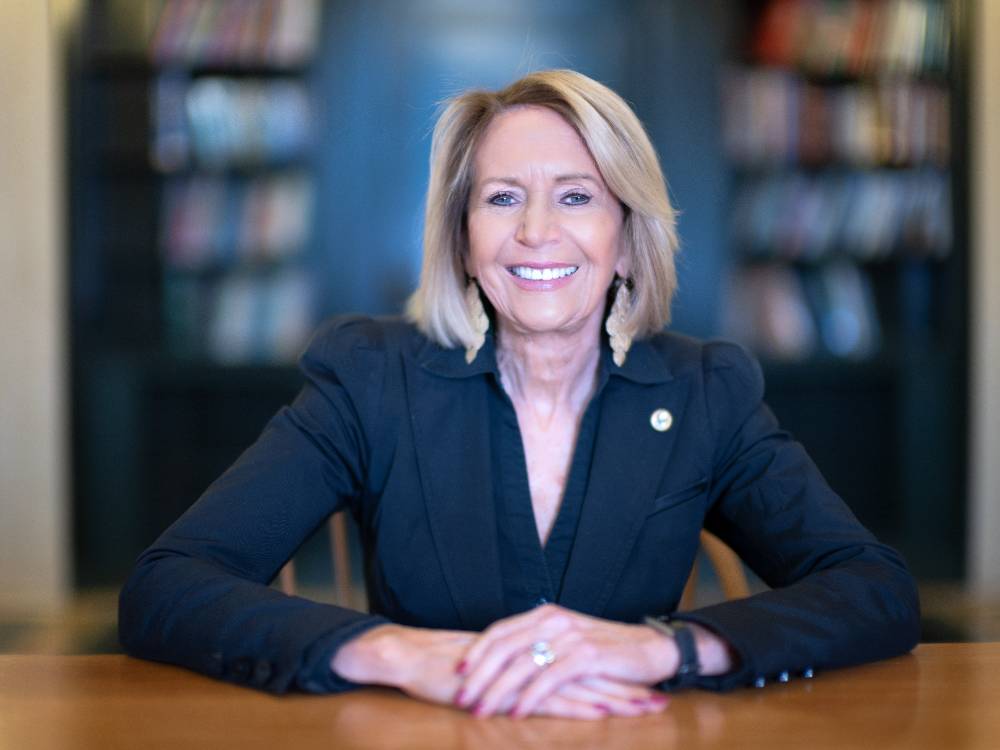
Marcia McNutt is a geophysicist and president of the National Academy of Sciences. From 2013 to 2016, she served as editor-in-chief of the Science journals. Prior to joining Science, she was director of the U.S. Geological Survey (USGS) from 2009 to 2013.During her tenure, the USGS responded to a number ofmajor disasters, including earthquakes in Haiti, Chile, and Japan, and the Deepwater Horizon oil spill. McNutt led a team of government scientists and engineers at BP headquarters in Houston who helped contain the oil and cap the well. She directed the flow rate technical group that estimated the rate of oildischarge during the spill’s active phase. For her contributions, she was awarded the U.S. Coast Guard’s Meritorious Service Medal. Before joining the USGS, McNutt served as president and chief executive officer of the Monterey Bay Aquarium Research Institute (MBARI), in Moss Landing, California. During her time at MBARI, the institution became a leader in developing biological and chemical sensors for remote ocean deployment, installed the first deep-sea cabled observatory in U.S. waters, and advanced the integration of artificial intelligence into autonomous underwater vehicles for complex undersea missions.
From 2000 to 2002, McNutt served as president of the American Geophysical Union (AGU). She was chair of the Board of Governors for Joint Oceanographic Institutions, responsible for operating the International Ocean Drilling Program’s vessel JOIDES Resolution and associated research programs. McNutt began her academic career at the Massachusetts Institute of Technology (MIT), where she was the E.A. Griswold Professor of Geophysics and directed the Joint Program in Oceanography/Applied Ocean Science & Engineering, jointly offered by MIT and the Woods Hole Oceanographic Institution. Her research area is the dynamics of the upper mantle and lithosphere on geologic time scales, work thathas taken her to distant continents and oceans for field observations.
She is a veteran of more than a dozen deep-sea expeditions, on most of which she was chief or co-chief scientist. McNutt received a B.A. in physics from Colorado College and her Ph.D. in Earthsciences at the Scripps Institution of Oceanography. She holds honorary doctoral degrees from the Colorado College, the University of Minnesota, Monmouth University, the Colorado School of Mines, University of Miami, Uppsala University, Michigan State University, Worcester Polytechnic Institute, George Washington University, Boston University, Texas A&M University, and Indiana University Bloomington.
McNutt is a member of the National Academy of Engineering, the American Philosophical Society and the American Academy of Arts and Sciences, and a Foreign Member of the Royal Society, UK, the Russian Academy of Sciences, and the Chinese Academy of Sciences. She is a fellow of AGU, the Geological Society of America, the American Association for the Advancement of Science, and the International Association of Geodesy. In 1988, she was awarded AGU’s Macelwane Medal for research accomplishments by a young scientist, and she received the Maurice Ewing Medal in 2007 for her contributions to deep-sea exploration.
October 21, 2021
Dr. Dawn Wright
Chief Scientist of the Environmental Systems Research Institute (Esri)
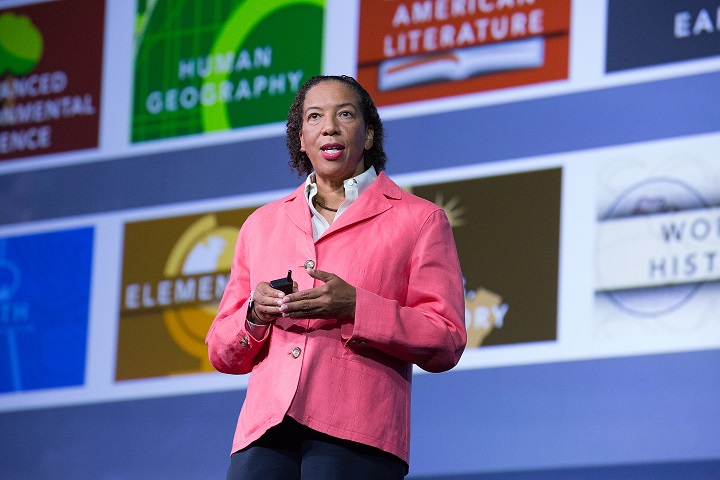
Dr. Dawn Wright is Chief Scientist at Esri, a world-leading geographic information system (GIS) software and data science company. Core to Esri’s mission is to inspire and enable people to positively impact their future by connecting them with the geoanalytic knowledge needed to make the critical decisions shaping the planet. Hence, Esri believes that geographyis at the heart of a more resilient and sustainable future. She was appointed to this post in October 2011 after 17 years as a professor of geography and oceanography at Oregon State University (OrSt). As Esri Chief Scientist, Dawn reports directly to the Esri CEO with a mission of strengthening the scientific foundation for Esri software and services, while representing Esri to the international scientific community. She maintains an affiliated faculty appointment as Professor of Geography and Oceanography in the College of Earth, Ocean, and Atmospheric Sciences at OrSt.
Dawn’s research interests include geospatial data science; seafloor mapping, coastal/ocean informatics, and environmental education. She has authored or co-authored more than 180 articles and 12 books on marine geographic information systems, hydrothermal activity and tectonics of mid-ocean ridges, and coastal/ocean informatics. Dawn has participated in over 20 oceanographic research expeditions worldwide, including 10 legs of the Ocean Drilling Program, three dives in the deep submergence vehicle Alvin and twice in the Pisces V. Her fieldwork has taken her to some of the most geologically active regions of the planet, including the East Pacific Rise, the Mid-Atlantic Ridge, the Juan de Fuca Ridge, the Tonga Trench, and volcanoes under the Japan Sea and the Indian Ocean. In 1991 she became the first African-American female to dive to the deep ocean floor in a deep submersible.
Dawn’s recent advisory board service, includes the NOAA Science Advisory Board, the US National Academy of Sciences Ocean Studies Board, the Board of COMPASS Science Communication Inc., the Ocean Discovery XPRIZE, and many journal editorial boards. She is a Fellow of the American Association for the Advancement of Science, the Geological Society of America, The Oceanography Society, the California Academy of Sciences, and Stanford’s Leopold Leadership Program, as well as a former Oregon Professor of the Year. In April 2021 she was elected to both the National Academy of Sciences and the American Academy of Arts & Sciences. She holds an Individual Interdisciplinary Ph.D. in Physical Geography and Marine Geology from UC-Santa Barbara, an M.S. in Oceanography from Texas A&M, and a B.S. cum laude in Geology from Wheaton College (Illinois). Other interests include road cycling, 18th-century pirates, apricot green tea gummy bears, her golden retriever puppy Riley, and Spongebob Squarepants. Follow her on Twitter at @deepseadawn.
October 21, 2019
Dr. Edith Widder
CEO and Senior Scientist Ocean Research & Conservation Association
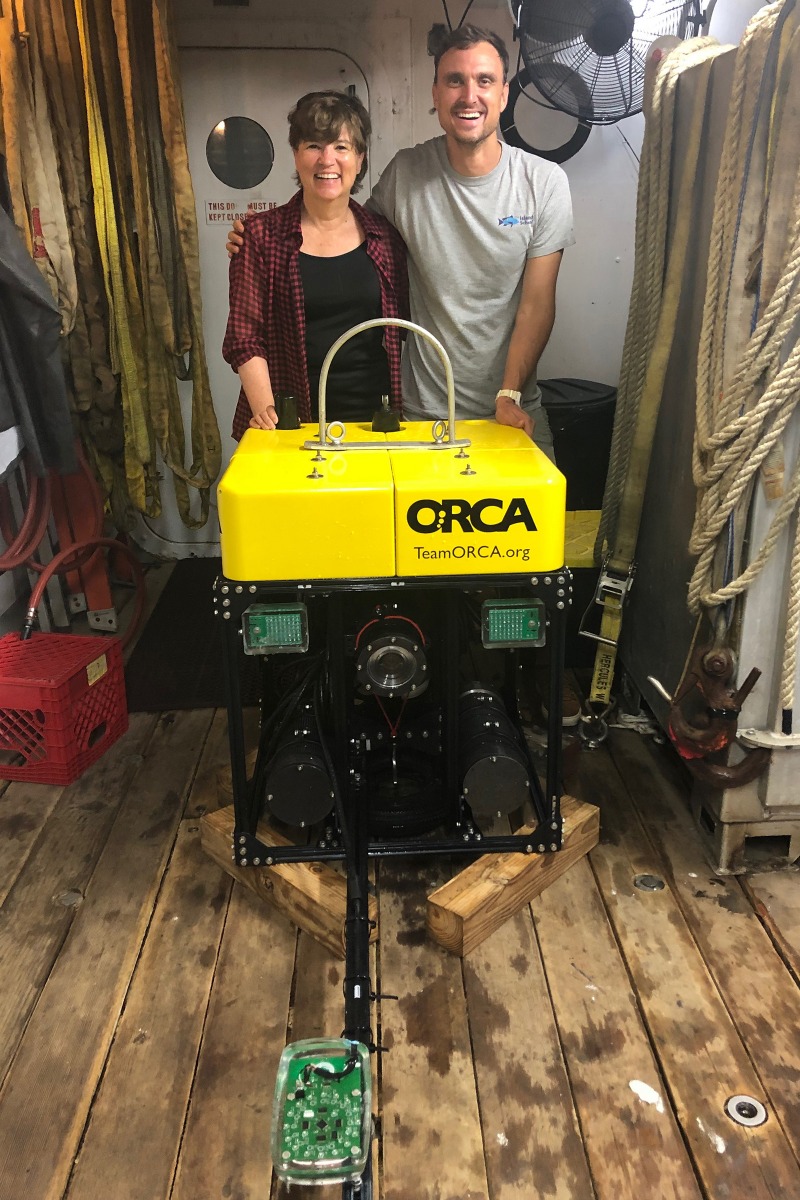 Dr. Edith Widder is an internationally renowned deep-sea explorer and founder of the
Ocean Research & Conservation Association (ORCA), a scientific-based conservation
nonprofit. A specialist in bioluminescence (the light chemically produced by many ocean organisms),
Widder has been a leader to design and invent submersible instrumentation and equipment
to enable unobtrusive deep-sea observations. Working with engineers, she has conceived
and built devices that enable humans to see beneath the waves in new ways.
Dr. Edith Widder is an internationally renowned deep-sea explorer and founder of the
Ocean Research & Conservation Association (ORCA), a scientific-based conservation
nonprofit. A specialist in bioluminescence (the light chemically produced by many ocean organisms),
Widder has been a leader to design and invent submersible instrumentation and equipment
to enable unobtrusive deep-sea observations. Working with engineers, she has conceived
and built devices that enable humans to see beneath the waves in new ways.
Two of Widder’s inventions include HIDEX, a bathyphotometer and the U.S. Navy standard for measuring bioluminescence in the ocean to keep submarines hidden, and LoLAR, an ultrasensitive deep-sea light meter that measures dim down-welling sunlight and bioluminescence in the deep ocean.
Widder is a certified Scientific Research Pilot for Atmospheric Diving Systems and holds certifications to dive the deep diving suit WASP, as well as the single-person untethered submersibles DEEP ROVER and DEEP WORKER. She has made over 250 dives in the JOHNSON-SEA-LINK submersibles.
Following 16 years as senior scientist at Harbor Branch Oceanographic Institute, Widder established ORCA to pioneer work in marine exploration and conservation, invent new ocean technologies and preserve the ocean. She created ORCA’s remotely operated deep-sea camera system Eye-in-the-Sea (EITS), which detects and measures the bioluminescence of nearby organisms on the sea floor and has produced footage of rare sharks, jellyfish and discovered a new species of large squid in their natural habitats.
Widder was awarded a MacArthur Fellowship in 2006 and participated in the 2010 TED Mission Blue Voyage to the Galapagos Islands along with other leading thinkers and advocates of ocean conservation. Her research and inventions have been featured on BBC, PBS and National Geographic television productions. In 2012, Widder and several other scientists filmed the giant squid in its natural habitat for the first time. The historic footage aired on the Discovery Channel in Jan. 2013. In June 2019 she repeated the feat using the same camera system in US waters.
Widder graduated magna cum laude from Tufts University where she received a Bachelor of Science degree in Biology. She also earned a Masters degree in Biochemistry and a PhD in Neurobiology awarded by the University of California, Santa Barbara.
October 23, 2018
Chris Fischer
Jacksonville University Explorer-In-Residence, OCEARCH Founding Chairman and Expedition Leader
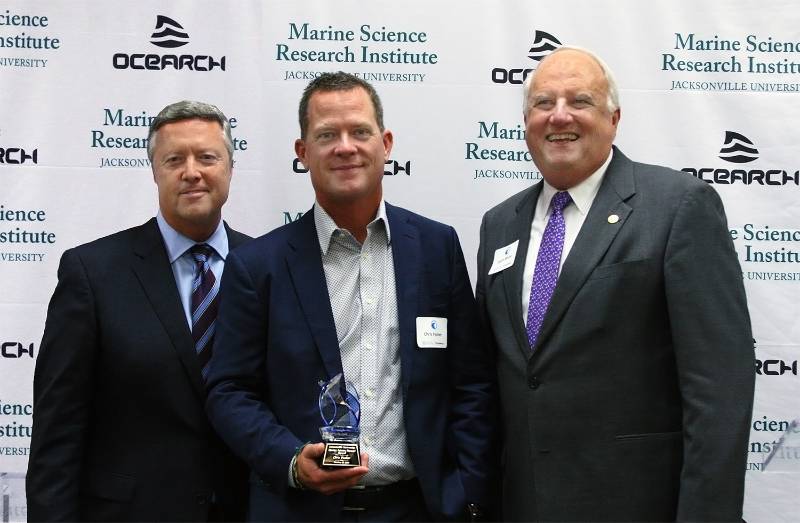 Chris Fischer is an ocean explorer who has led 32 global expeditions to accelerate
the ocean’s rejuvenation to balance and abundance, by unlocking the life history puzzle
of white sharks and other keystone species through expeditions aboard his ship, the
OCEARCH. Fischer’s multi-disciplined and collaborative approach has enabled 174 scientists
from 90 international and regional institutions, greatly increasing the efficiency
and effectiveness of ocean research. This has led to 22 scientific published papers
and more than 30 papers in progress. This research is being leveraged to drive data-centric
policy decisions. Fischer has worked on ocean environmental protection policies with
presidents of a number of countries, including the U.S. Fischer believes in creating
inspirational learning environments. In 2013, OCEARCH’s Global Shark Tracker was launched.
This website and app allows students, the public, and scientists to learn about sharks
while tracking them across the planet in near-real-time. In 2014, a STEM curriculum
based on the Tracker was introduced. Since then, 100+ lesson plans have been downloaded
in 45 states. In 2017, OCEARCH joined forces with Jacksonville University to foster
unique opportunities for college student-centric education and promote experiential
learning. Not only do students benefit from this collaboration at a classroom level,
but they are also involved at the forefront of high-caliber research. From 2009 to
2012, Fischer hosted 30 hours of TV episodes on National Geographic Channel and 10
hours on the History Channel, chronicling the research on the white shark. From 2001
to 2009, he hosted the four-time Emmy Award-winning “Offshore Adventures.” It was
the #1 watched outdoor TV series and had the goal of pouring the oceans back into
people’s lives, as Fischer believes that most people are disconnected from the ocean.
Fischer has received numerous recognitions, including The Explorers Club Lowell Thomas
Medal for Imagination in Exploration and the Nominee Trust 100 Award for top social
innovators list. OCEARCH has been featured in more than 10,000 outlets including
The New York Times, CNN, CBS Morning News, The Wall Street Journal, USA Today and
most major news media organizations worldwide. His work is being supported through
socially innovative partnerships with Costa Sunglasses, SeaWorld, Jacksonville University,
YETI Coolers, and Southern Tide.
Chris Fischer is an ocean explorer who has led 32 global expeditions to accelerate
the ocean’s rejuvenation to balance and abundance, by unlocking the life history puzzle
of white sharks and other keystone species through expeditions aboard his ship, the
OCEARCH. Fischer’s multi-disciplined and collaborative approach has enabled 174 scientists
from 90 international and regional institutions, greatly increasing the efficiency
and effectiveness of ocean research. This has led to 22 scientific published papers
and more than 30 papers in progress. This research is being leveraged to drive data-centric
policy decisions. Fischer has worked on ocean environmental protection policies with
presidents of a number of countries, including the U.S. Fischer believes in creating
inspirational learning environments. In 2013, OCEARCH’s Global Shark Tracker was launched.
This website and app allows students, the public, and scientists to learn about sharks
while tracking them across the planet in near-real-time. In 2014, a STEM curriculum
based on the Tracker was introduced. Since then, 100+ lesson plans have been downloaded
in 45 states. In 2017, OCEARCH joined forces with Jacksonville University to foster
unique opportunities for college student-centric education and promote experiential
learning. Not only do students benefit from this collaboration at a classroom level,
but they are also involved at the forefront of high-caliber research. From 2009 to
2012, Fischer hosted 30 hours of TV episodes on National Geographic Channel and 10
hours on the History Channel, chronicling the research on the white shark. From 2001
to 2009, he hosted the four-time Emmy Award-winning “Offshore Adventures.” It was
the #1 watched outdoor TV series and had the goal of pouring the oceans back into
people’s lives, as Fischer believes that most people are disconnected from the ocean.
Fischer has received numerous recognitions, including The Explorers Club Lowell Thomas
Medal for Imagination in Exploration and the Nominee Trust 100 Award for top social
innovators list. OCEARCH has been featured in more than 10,000 outlets including
The New York Times, CNN, CBS Morning News, The Wall Street Journal, USA Today and
most major news media organizations worldwide. His work is being supported through
socially innovative partnerships with Costa Sunglasses, SeaWorld, Jacksonville University,
YETI Coolers, and Southern Tide.
October 10, 2017
Dr. Robert Ballard
Renowned Ocean Explorer and Scientist
Dr. Robert Ballard is Founder and President of the Ocean Exploration Trust; Director of the Center for Ocean Exploration and Professor of Oceanography at the University of Rhode Island Graduate School of Oceanography. He is an Explorer-In-Residence at the National Geographic Society, Commissioner for the U.S. Commission on Ocean Policy, and a Senior Scientist Emeritus at the Woods Hole Oceanographic Institution. He served in the U.S. Navy for more than 30 years and continues to work with the Office of Naval Research. A pioneer in the development of deep-sea submersibles and remotely operated vehicle systems, he has taken part in more than 140 deep-sea expeditions. In 1985, he discovered the RMS Titanic, and has succeeded in tracking down numerous other significant shipwrecks, including the German battleship Bismarck, the lost fleet of Guadalcanal, the U.S. aircraft carrier Yorktown, and John F. Kennedy’s boat, PT-109. He has also discovered hydrothermal vents and “black smokers” in the Galapagos Rift and East Pacific Rise in 1977 and 1979. The author of numerous books, scientific papers, and articles, he has been featured in several National Geographic television programs, including “Secrets of the Titanic” and a more recent five-part mini-series, “Alien Deep with Bob Ballard.” He was a special advisor to Steve Spielberg on the futuristic television show seaQuest DSV. His honors include 22 Honorary Doctorates, National Geographic’s highest award, the Hubbard Medal, and a National Endowment for the Humanities Medal. He was elected a Fellow of the American Academy of Arts and Sciences in 2014.

